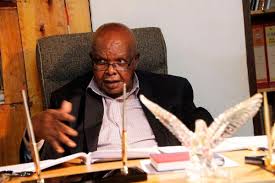 Prominent historians have paid tribute to the late Professor Bethwell Ogot, celebrating his monumental contributions to nationalist historiography and African intellectualism.
Prominent historians have paid tribute to the late Professor Bethwell Ogot, celebrating his monumental contributions to nationalist historiography and African intellectualism.
Ogot, a towering figure in Kenya’s academic and historical landscape, was honoured during a recent edition of The Toyin Falola Interviews under the theme: Bethwell Ogot: Historian and Service to Africa. The event, held on Sunday, featured leading scholars and was live streamed across various social media platforms.
The panel included renowned scholars such as Professor Toyin Falola, Professor Mary Nyangweso of East Carolina University, Professor Maurice Nyamanga Amutabi of the Technical University of Kenya, Professor Eunice Kamaara, Director of The African Character Initiation Programme, and Professor Fred Muyia Nafukho, Vice Provost for Academic Personnel at the University of Washington’s Foster School of Business.
Professor Ogot’s scholarship spanned historical, socio-political, and economic dimensions of postcolonial Africa. As the founder of the Historical Association of Kenya, he mentored generations of African historians, advocating for an African-centered approach to historical writing. His extensive publications and leadership in decolonising African knowledge production continue to influence contemporary intellectual debates.
Speaking at the event, Professor Amutabi described Ogot as “Kenya’s academic Moses” and an “academic Goliath with a Solomonic mind.” He recalled Ogot’s gift as a storyteller, his role in shaping Kenya’s historical discourse, and his deep commitment to mentoring young scholars. Amutabi emphasised Ogot’s pivotal role in integrating oral history into academic scholarship, resolving longstanding ambivalences in African historiography.
“He reconstructed Kenyan history from a fragmented past to a coherent national narrative,” Amutabi remarked. “He mentored many of us, directly and indirectly. I consider myself his academic grandchild, as he taught my professors, including E.S. Atieno Odhiambo and Gideon Saulo Were.”
Professor Nafukho recalled a 1995 conference at Egerton University where Ogot’s keynote speech left a lasting impression. “Ogot championed interdisciplinary research long before it became a mainstream academic approach. His legacy extends beyond history—he was also a scholar of mathematics and philosophy.”
Professor Nyangweso lauded Ogot as “Kenya’s ultimate historian,” describing his scholarship as foundational for generations of African historians. “It is impossible to grow up in Kenya as a scholar without engaging with Ogot’s work,” she stated. “His writings have illuminated Africa’s historical narrative, giving voice to the continent’s past and its people’s accomplishments.”
She emphasised Ogot’s efforts in shaping the study of East African history and his global influence in reshaping the perception of Africa’s past. “His book, My Footprints in the Sands of Time, calls upon us as scholars to leave our mark, just as he did.”
Professor Kamaara shared a personal anecdote of meeting Ogot at a conference in the early 1990s, where he affirmed her budding academic career. “I was presenting one of my first papers, expecting harsh criticism, but the first response came from Ogot himself—a word of affirmation. That encouragement stayed with me throughout my career.”
In his introductory remarks, Professor Falola positioned Ogot within the broader context of Africa’s post-World War II reforms. He explained how the emergence of African universities, such as Makerere and the University of Ibadan, played a crucial role in nationalist historiography.
“Ogot’s generation championed the African perspective in history,” Falola noted. “They rejected the Eurocentric notion that African history began with colonial conquest and instead illuminated Africa’s deep historical roots, achievements, and transformations.”
Reflecting on Ogot’s impact, Professor Anthony Asiwaju shared a personal tribute: “He was my external assessor for professorship in 1978. I only learned yesterday that he had joined the ancestors. May his soul rest in peace.”
The Toyin Falola Interviews continues to amplify African voices, celebrating the continent’s heroes and intellectual traditions. As the tributes to Bethwell Ogot illustrate, his legacy as a historian, mentor, and thought leader endures, inspiring future generations to deepen Africa’s historical consciousness and scholarship.






